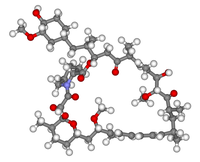
Photo from wikipedia
Naturally occurring mutations in two separate genes, PKD1 and PKD2, are responsible for the vast majority of all cases of autosomal dominant polycystic kidney disease (ADPKD), one of the most… Click to show full abstract
Naturally occurring mutations in two separate genes, PKD1 and PKD2, are responsible for the vast majority of all cases of autosomal dominant polycystic kidney disease (ADPKD), one of the most common genetic diseases affecting 1 in 1000 Americans. The hallmark of ADPKD is the development of epithelial cysts in the kidney, liver, and pancreas. PKD1 encodes a large plasma membrane protein (PKD1, PC1, or Polycystin-1) with a long extracellular domain and has been speculated to function as an atypical G protein coupled receptor. PKD2 encodes an ion channel of the Transient Receptor Potential superfamily (TRPP2, PKD2, PC2, or Polycystin-2). Despite the identification of these genes more than 20 years ago, the molecular function of their encoded proteins and the mechanism(s) by which mutations in PKD1 and PKD2 cause ADPKD remain elusive. Genetic, biochemical, and functional evidence suggests they form a multiprotein complex present in multiple locations in the cell, including the plasma membrane, endoplasmic reticulum, and the primary cilium. Over the years, numerous interacting proteins have been identified using directed and unbiased approaches, and shown to modulate function, cellular localization, and protein stability and turnover of Polycystins. Delineation of the molecular composition of the Polycystin complex can have a significant impact on understanding their cellular function in health and disease states and on the identification of more specific and effective therapeutic targets.
Journal Title: Cellular signalling
Year Published: 2020
Link to full text (if available)
Share on Social Media: Sign Up to like & get
recommendations!